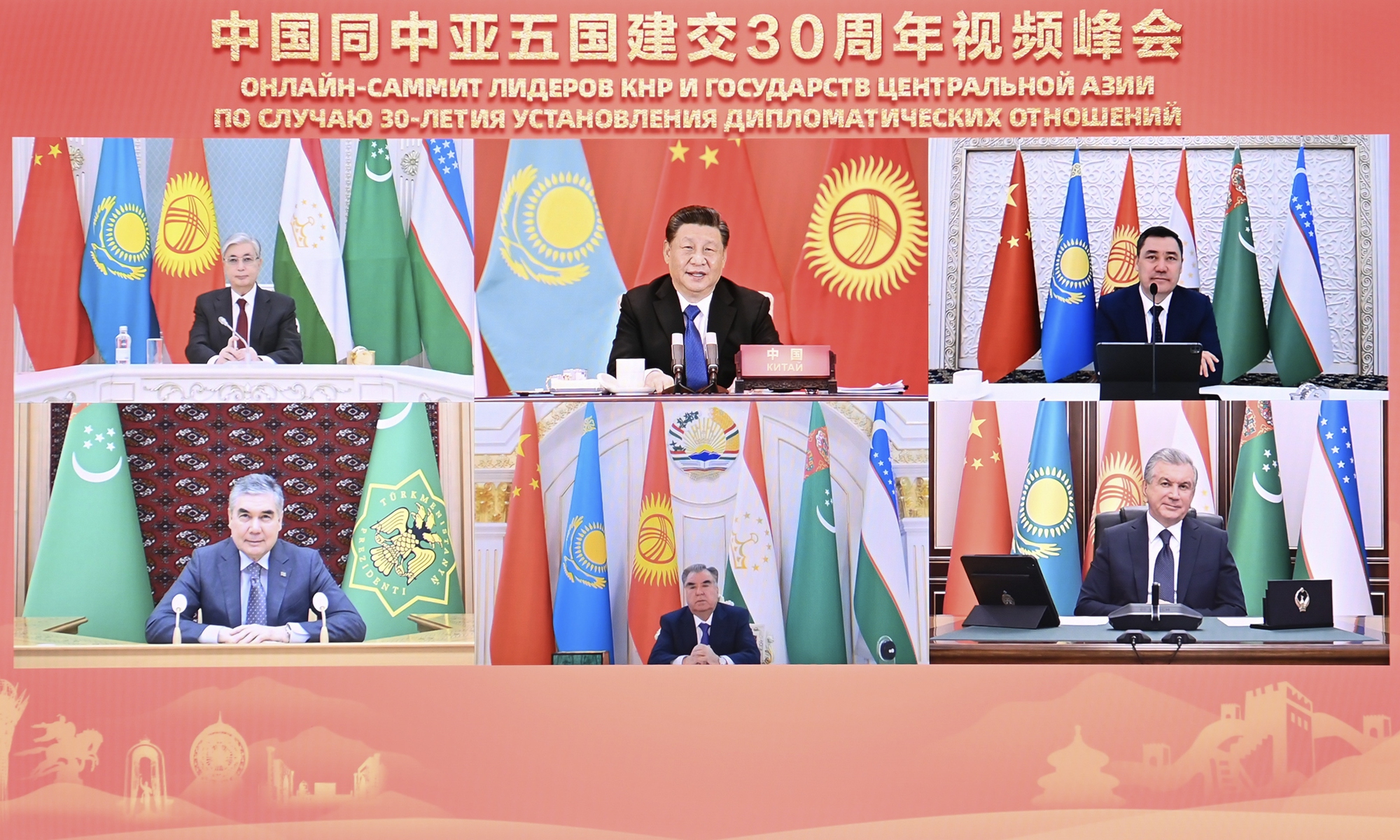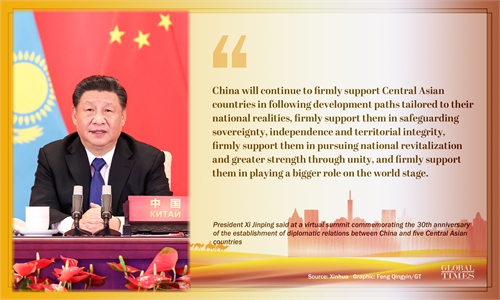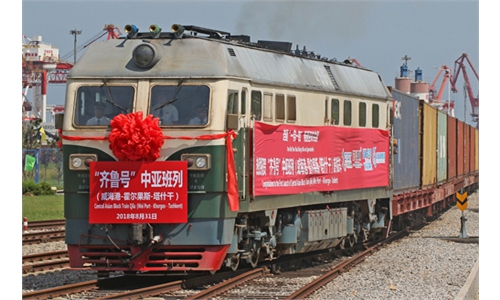China-Central Asia neighborly relations a good lesson to Washington: Global Times editorial

Chinese President Xi Jinping (center top) speaks from Beijing at a virtual summit commemorating the 30th anniversary of the establishment of diplomatic relations between China and five Central Asian countries. Photo: Xinhua
The five Central Asian countries are China's neighbors and share a border of more than 3,300 kilometers with China, as well as many cross-border ethnic groups. Despite a Chinese saying that distant relatives are not as good as close neighbors, neighboring countries tend to fall into disputes, frictions, and even conflicts because of historical entanglements and differences. It is very rare for China and the five Central Asian countries to become as close as relatives. Since the establishment of diplomatic relations 30 years ago, China's ties with Central Asian countries have grown by leaps and bounds, reaching a historic high and setting a good example in building a new type of international relations. The experience is of significance and value to the world of conflicts and turbulence, which is worth carefully summarizing.
The four principles Xi summarized at the meeting - mutual respect, good neighborly friendship, solidarity in trying times, and mutual benefit - are the code of success for the 30-year cooperation between China and the five Central Asian countries. By adhering to these principles, the two sides have not only resolved the boundary issue left over by history on the basis of mutual understanding and accommodation, but have also become "good neighbors, good partners, good friends and good brothers." Trade between China and the five Central Asian countries increased by more than 100 times in the past 30 years since the establishment of diplomatic relations, with China's direct investment in the five countries exceeding $14 billion. Today, China has become one of the most important trade and investment partners of the five countries.
It is worth mentioning that Xi first proposed to build a Silk Road Economic Belt during a visit to Kazakhstan in 2013. In terms of jointly building the Belt and Road, China and the five Central Asian countries have been at the forefront of the world from the very beginning, and have achieved remarkable results. A large number of major projects involving transportation, agriculture, water conservation, electric power, textile, machinery, manufacturing and other fields have broken ground. People of the six countries have all benefited from common development. China and the five Central Asian countries have built a "prototype" of cooperation under the framework of the Belt and Road Initiative.
Of course, some people may not want to see such a good situation. Some geo-politicians in the US often calculate how to "control" Central Asia to achieve their goal of "controlling" the Eurasian continent. At the beginning of their independence, the five Central Asian countries were regarded by the US as a new power vacuum to fill. In recent years, the US has increased its input in the region, hoping to plunge the two knives - military deployment and "color revolution" - into Central Asia, trying to disrupt the region to achieve the strategic attempt to contain China and Russia at the same time, but these tactics didn't work.
Last year, the Biden administration put together some partners to hold a so-called Summit for Democracy, without inviting China and Russia, or the five Central Asian countries. After the US' embarrassing withdrawal from Afghanistan, it proposed to deploy troops in Central Asian countries, but was rejected without exception. In this world, there are those who insist on mutual respect, and those who promote hegemony; those who insist on good neighborliness and friendly relations, and those who insist beggar-thy-neighbor policy; who insist on pulling together in times of trouble, and who is engage in unilateralism; who insist on mutual benefit and win-win cooperation, and who are stuck in zero-sum games. Central Asian countries are aware of this.
At the historical juncture of the 30th anniversary of the establishment of diplomatic relations between China and Central Asia, we believe that the new model of international relations built by the six countries can be a good lesson for Washington by reviewing the experiences of exchanges of the two sides during all these years.
For some time, Washington has been keen on instigating China-Russia "competition" in Central Asia, regarding the region as "pawns" of big power game. It is to gauge the heart of a gentleman with one's own mean measure. The truth is China and Russia have deepened their exchanges and cooperation with Central Asian countries. At the same time, the China-Russia comprehensive strategic partnership of coordination for a new era has reached a historic high. Such a view is emerging again due to recent situation in Central Asia. But while Washington has invested the most in driving a wedge between China and Russia, the effect is the worst.
The Beijing Winter Olympic Games will begin in less than 10 days. Good neighbors are preparing to come to congratulate - President Xi, President Putin and heads of state of five Central Asian countries will gather at the opening ceremony of Beijing 2022. Is there anything else more telling than this picture?



